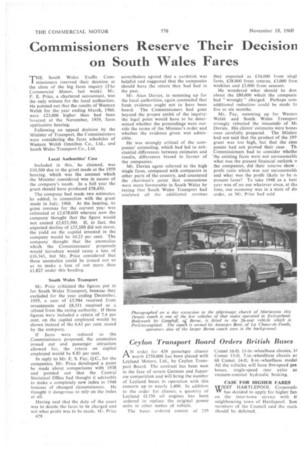Commissioners Reserve Their Decision on South Wales Fares
Page 62

If you've noticed an error in this article please click here to report it so we can fix it.
THE South Wales Traffic Commissioners reserved their decision at the close of the big fares inquiry (The Commercial Motor, last week). Mr. F. E. Price, a chartered accountant, was the only witness for the local authorities. He pointed out that the results of Western Welsh for the year ending March, 1960, were 123,000 higher than had been forecast at the November, 1959, fares ipplication hearing.
Following an appeal decision by the Minister of Transport, the Commissioners were considering the fares schedules of Western Welsh Omnibus Co., Ltd., and South Wales Transport Co., Ltd.
Local Authorities' Case Included in this, he claimed, was £10,300 due to the grant made at the 1959 hearing, which was the amount which the Minister considered was in excess of the company's needs. In a full year the grant should have produced £58,450.
The company had made two estimates, he added, in connection with the grant made in July, 1960. At the hearing, its gross revenue for the current year was estimated at £2,678,600 whereas now the company thought that the figure would not exceed £2,623,500. If, in fact, the expected decline of £55,100 did not Occur, the yield on the capital invested in the company would be 10.23 per cent. The company thought that the anomalies which the Commissioners' proposals would introduce would cause a loss of £16,341, but Mr. Price considered that these anomalies could be ironed out so as to make a loss of not more than £1,825 under this heading.
South Wales Transport Mr. Price criticized the figures put in for South Wales Transport, because they excluded for the year ending December, 1959, a sum of £5,984 received from investments and £8,351 received as a refund from the rating authority. If these figures were included a return of 7.4 per cent. on the capital employed would be shown instead of the 6.63 per cent, stated by the company.
If fares were reduced as the Commissioners proposed, the anomalies ironed out and passenger attraction allowed for, the return on capital employed would be 6.83 per cent.
In reply to Mr. E. S. Fay, Q.C., for the companies, Mr. Price developed a point he made about comparisons with 1938 and pointed out that the Central Statistical Office had thought it advisable to make a completely new index in 1948 because of changed circumstances. He thought it dangerous to rely on the index at all.
Having said that the duty of the court was to decide the fares to be charged and not what profit was to be made, Mr. Price B28 nevertheless agreed that a yardstick was helpful and suggested that the companies should have the return they had had in the past.
Mr. Akin Davies, in summing up for the local authorities, again contended that fresh evidence ought not to have been heard. The Commissioners had gone beyond the proper ambit of the inquiry: the legal point would have to be determined whether the proceedings were out. side the terms of the Minister's order and whether the evidence given was admissible.
He was strongly critical of the companies' estimating, which had led to substantial differences between estimates and results, differences biased in favour of the companies.
Mr. Davies again referred to the high single fares, compared with companies in other parts of the country, and countered the chairman's point that concessions were more favourable in South Wales by saying that South Wales Transport had analysed all the additional revenue
they expected as £34,000 from singl, fares, £28,000 from returns, £3,000 fron weeklies and £5,000 from seasons.
He wondered what should be don. about the £80,000 which the companie had " wrongly " charged. Perhaps som, additional reduction could be made fo five or six months.
Mr. Fay, summing up for Wester] Welsh and South Wales Transport strongly rebutted the innuendo of Mt Davies. His clients' estimates were hones ones carefully prepared. The Ministe bad not said that the product of the .195' grant was too high, but that the Corn panics had not proved their case. Th, Commissioners had to consider whethe the existing fares were not unreasonable what was the present financial outlook o the companies, did their returns show. ; profit ratio which was not unreasonable and what was the profit likely to be oi present fares? To take 1948 as a basi, year was of no use whatever since, at tha time, our economy was in a state of dis order, as Mr. Price had said.




































































































































